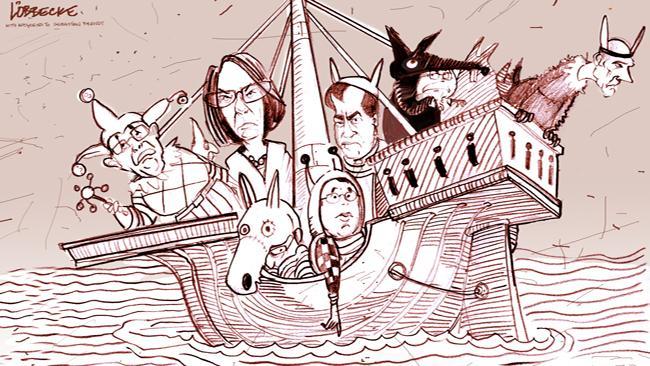
HAVING picked the wrong lifeboat, Labor seems set to clamber back on the Titanic. With the mast broken, the rudder lost and the rocks looming, the backbench's panic is understandable: and their despair is far more credible than Julia Gillard's claim that the raft really is afloat and making headway.
Gillard's problem is that like all regicides, her legitimacy rests solely on being able to deliver for her backers; with that in tatters, the result is mayhem not seen in federal politics since the collapse of the Scullin Labor government in 1931. But at least that government shattered on matters of principle; bereft of principles from the outset, the Gillard government has none over which to brawl. Little wonder its death agonies have all the dignity of a fight between rabid dogs.
The contrast with the end of the Howard era could not be greater. But looking outside the Canberra madhouse, there are some eerie parallels.
After all, John Howard fell victim to voters' perception that life was getting tougher. Yes, real incomes were increasing rapidly, and import prices falling. But people only buy plasma televisions infrequently, so reductions in their prices have little weight in our sense of disposable income, all the more as those purchases are discretionary. Rather, it is unavoidable purchases that matter; and with the price of necessities rising, Labor's cost of living campaign found fertile ground.
So did the attack on Work Choices. Fear is a stronger, more primal, emotion than hope; and Work Choices was readily portrayed as Nightmare on Elm Street. Moreover, as Work Choices became increasingly complex, it proved easy for people to worry it was aimed at them - or might be in future.
But however potent those anxieties were, they are even stronger now. Consider bills for utilities, which are impressed on every consumer's mind by their sheer size and regularity. In the Howard government's last year, electricity prices rose 6 per cent; this year they have increased by almost three times that. Indeed, the average annual electricity bill is nearly $1000 higher today than it was when Labor was elected: an 80 percent increase in real terms, outstripping average wages by a factor of four.
Nor is it only utilities that have gone up. Charges for health and education rose 4 per cent in 2006-07; this year they have increased 6 per cent off a much higher base. And despite government rebates, child care costs have risen 8 per cent, and that rise could double as mandated increases in pay and staffing come into effect.
Moreover, those price hikes are occurring at a time of slowing growth. Real per capita income, which was rising strongly at the end of the Howard era, has been falling for over a year, while per capita GDP is growing at barely one-tenth the rate of late 2007.
With the Fair Work Act aggravating labour market rigidities, weak growth is translating into poorer employment outcomes. Already, unemployment is a third higher than in Howard's final months, while last week's employment data imply the number of jobs is rising at less than half the growth rate of the working-age population.
It is hardly surprising then that the number of employed Australians who say there is a chance that they may become unemployed is higher than at any time since December 2001, while the number who regard their job as safe is the lowest it has been since July 1997.
Gillard's words in 2007 should therefore ring in her ears: "Our Prime Minister boasts Australian working families 'have never had it so good'. But times are much tougher than he imagines, and mounting insecurity has made Australians very worried about the future." Hence her promise: "We will take the pressure off families."
But it is not only that puffery that deserves to haunt Labor; it is also the commitment Labor then made to "cement prosperity beyond the mining boom". And in that respect too the past echoes today.
In 2007, Peter Costello warned that the unfolding sub-prime crisis posed "big risks to the US economy, from which Australia is not immune". Costello's warnings were derided by Wayne Swan and Kevin Rudd, who later claimed the GFC was a complete surprise.
Now, however, the world economy again faces enormous uncertainties, with the International Monetary Fund cutting its global growth forecasts, Morgan Stanley downgrading its projections for China and share prices in emerging markets tumbling.
Yet we are far more poorly placed to handle renewed volatility than when Labor came to office. Our international competitiveness has deteriorated sharply: real labour costs per unit of output, after declining steadily since 1997, started rising in 2011, while the profits share of national income, which has been trending upwards since 1990, fell by more than 2 percentage points. With export prices also falling, those high labour costs are unsustainable; but the industrial relations laws will make unwinding them difficult and painful. And as the Parliamentary Budget Office has emphasised, an accelerated fall in the terms of trade would dramatically worsen our structural budget position, risking a return to spiralling debt.
But far from managing those threats, Gillard seems intent on entrenching as many bad policies as she can, while locking in one unaffordable spending commitment after the other. Captive to the unions that created her, her goal is to spoil Tony Abbott's pitch, regardless of the costs.
Even more than the scandals that have swirled about her, it is that willingness to undermine our prosperity that makes Gillard unfit to govern. Even more than the chaos that surrounds her, it breaks faith with the electorate, compromising its right to change course. And even more than the repeated failures, it is why Labor's only refuge is on the ship of fools.



